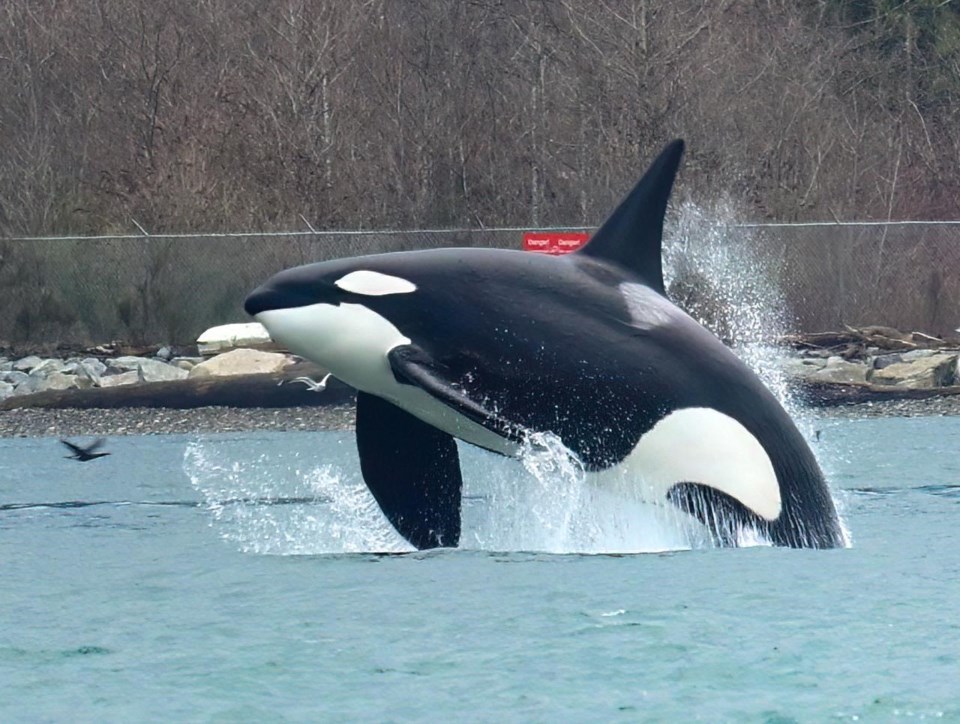HALIFAX ‚Äî A Halifax-based biologist who helped to document the first recorded case of an orca caring for the offspring of another species says the finding sheds light on a complex animal relationship.¬Ý
Elizabeth Zwamborn, a researcher at Dalhousie University, is part of a research group that spotted a female orca — or killer whale — caring for a newborn long-finned pilot whale calf off Iceland when there were no other pilot whales nearby.
Zwamborn said researchers believe the orca may have tried to adopt the newborn pilot whale, as the orca has never been spotted with a calf of her own.
‚ÄúWe didn‚Äôt know this was something they did,‚Äù Zwamborn said in an interview Thursday.¬Ý
“We have never seen killer whales caring for another species, we’ve never seen cross-species adoption with killer whales — probably because they’re an apex predator.”
The team's findings have been recently published in the Canadian Journal of Zoology, in the article "First account of apparent alloparental care of a long-finned pilot whale calf."
The pilot whale calf was seen swimming in a “protected position” right next to the killer whale in August 2021 near the western coast of Iceland.
Zwamborn said this behaviour is typically seen in a parent and offspring duo, as it allows the calf to swim easily and requires the adult whale to exert extra energy to keep the newborn close by.¬Ý
‚ÄúThis is how we know it‚Äôs a caring or nurturing behaviour and it doesn‚Äôt mean she wants to save (the pilot whale) for a snack later,‚Äù she said.¬Ý
Zwamborn said that while researchers can‚Äôt know for sure, she and her colleagues suspect the killer whale took the newborn away from its parents.¬Ý
She said it‚Äôs possible that this particular orca has been unsuccessful in either getting pregnant or keeping a newborn orca alive and went out in search of its own whale calf.¬Ý
‚ÄúI‚Äôd love to be able to ask her why,‚Äù Zwamborn said of the killer whale‚Äôs adoption of this pilot whale offspring.¬Ý
“My best guess is that there’s jealousy or longing for having a calf of her own. This may be her way of finding a substitute to that.”
Zwamborn said this discovery may shed some light on another strange behaviour that researchers have been seeing in whales in Iceland. She said pilot whales have been recorded chasing killer whales, which confused researchers given that killer whales are the dominant predator.¬Ý
Knowing that an orca has adopted a pilot whale calf, Zwamborn said it’s possible that pilot whales are grouping together to chase off orcas in order to protect their young from abduction.
In the case of this adopted pilot whale, because the calf appeared underfed when it was spotted and it has not been seen alongside the killer whale since, Zwamborn said it‚Äôs likely the calf has died.¬Ý
“We humans love to think of this as a kind of Disney-like, heartwarming adoption story," she said.
"But unfortunately, the only time it’s successful is when a whale already has young of its own, or they’ve just lost their young,” she said, which is when a whale is still producing milk and can feed a newborn.
Researchers say killer whales and long-finned pilot whales have similar social structures, but the 2021 sighting was the first time scientists have recorded an orca caring for a pilot whale calf.
This report by The Canadian Press was first published Feb. 23, 2023.
---
This story was produced with the financial assistance of the Meta and Canadian Press News Fellowship.
Lyndsay Armstrong, The Canadian Press




